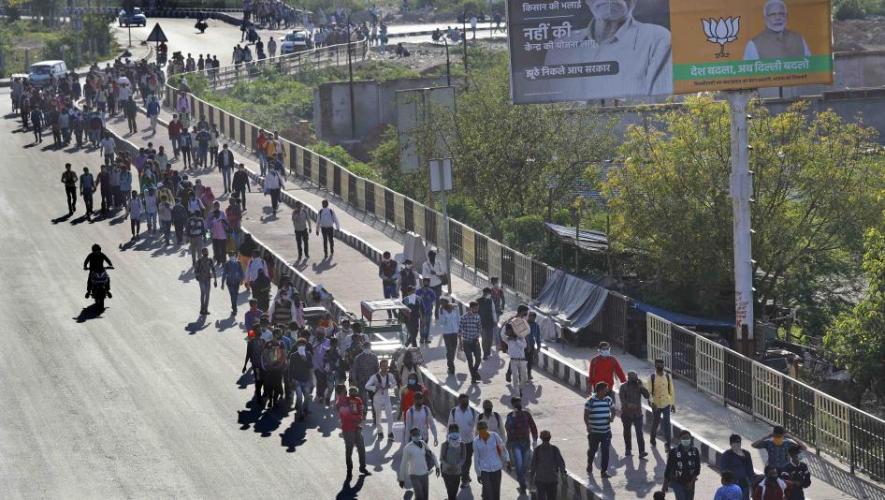Covid Truth: Elite NRIs Are Dearer to Modi than Domestic Migrants

Image Courtesy: Human Rights Watch
A few years back, when I presented my ongoing doctoral research on Indian guest workers at a conference in Germany, many of my peers were confused. Who is a ‘guest worker’? A guest worker is one who is part of a mobility group that works at a place for a few years, then moves on to another place or country etc.
In the German context, ‘guest worker’ is a value-laden term. In the post-war period Germany had ‘invited’ the Turkish people to contribute to nation-building—they called them ‘guest workers’. A majority of these works involved blue-collar jobs. That consequently led to stereotyping of a person of Turkish origin in Germany even after all these years as one originally meant to do menial jobs.
In my research, however, I referred to the white-collar IT, finance and banking professionals from India, who are working in Germany as part of the mobility group that the sociologist N Jayaram has termed as the “sojourners”. One of the several comments on my paper was that it is more appropriate to refer to these white-collar ‘professionals’ as expats—firstly, unlike the Turkish migrants in Germany, these are no blue-collar workers; secondly, and consequently, they must be classified with a more sophisticated term than ‘guest worker’.
Nevertheless, I stuck to the original term because through my research I proved that they are no less a part of the international migration of cheap labour. Their workplace exploitations might be different, but was no less, and they practised ‘self-exclusion’.
However, in the last few years, India has emerged as one of the leading countries with a huge amount of outward migration of middle and upper middle class white-collar workers, professionals, students and artists temporarily (that is, leaving their extended families behind) moving to the ‘West’. These are transnational migrants that keep travelling between ‘home’ and ‘host’, sharing spaces, dreams and remittances and actively cheering for the oh-so-foreign-savvy Prime Minister of India.
Several of them are highly active in the already consolidated Indian (read Hindu) diaspora in the USA or the United Kingdom or Canada, to name a few. They are the people that the Prime Minister travels to impress across the world—the diasporic Indians. With a visible Hindu(tva) dominance, these Indians are the biggest contributors and consumers of the emerging neo-liberal market, caught between the emotional drama of ‘swadesh’ while savouring the fruits of the ‘pardes’.
Diasporic Hindus are the Prime Minister’s biggest cheerleaders as well as generous donors for his party, the BJP. Consequently, Modi batted no eyelid before bringing them all “home” in specially-organised air planes as the Covid-19 epidemic started scaling up in different countries. Fair enough. But what happened after they returned? Were they tested? Were they isolated? Were they quarantined when necessary? If ‘yes’ is the answer, then we would not have to shudder at the thought of the impending doom that community transmission of the virus means for the 1.3 billion Indians today.
Nevertheless, the Prime Minister’s heart still bled for these migrants and he intended to help them.
These migrants came home, some roamed around, some stayed home, some partied. Meanwhile, we all clapped and danced on 22 March. Then the Prime Minister declared a 21-day lockdown of the entire country. But amidst all this, he forgot another category of migrants whom we see as sidekicks and call the daily labourers. They are blue-collar workers, poor, vulnerable and many in numbers. They are what we could call the low-impact category.
Notwithstanding all this, they also are migrants. Like the transnational migrants, these people also constitute a mobility group who are trans-regional. Belonging to the informal sector has lent them no effective agency in the society at large, although they are the people who build the cities and skyscrapers. But our Prime Minister forgot about them, because they are not flashy, they have no money to carry out the informal PR that the diaspora does for him.
So, while the transnational white-collar migrants were brought back home in special aircraft, the blue-collar trans-regional migrants are now walking from Delhi to Kerala, from Mumbai to Bihar, from Hyderabad to Varanasi—with children, many carrying heavy bundles, unfed for days and with no money in their pocket.
In neo-liberal societies, which, evidently, are falling apart as we witness Covid-19 draw closer with each passing day, the rights of citizens is emerging as the biggest joke. While several of the ‘expats’ would never be in India to cast their votes during elections, the poor migrants would always do so. Looking from the perspective of vote banks, the blue-collar trans-regional migrants are more stable than their white-collar counterparts. Despite that, the Prime Minister chose to stand by one and abandon the other. He chose international PR over a stable vote bank. While both are migrants—they are hardly the same. Interestingly, now the Kerala government is calling the poor migrants as guest workers and organising food and shelter for them. Will the ‘expats’ appreciate this synonymity?
The elite, white-collar transnational migrants brought the virus to India, under the guardianship of our Prime Minister, and gave the virus to the poor, blue-collar trans-regional migrants, while he only watched, and the middle class clapped. In an exceedingly status-driven society like India, it is now migrant versus migrant.
The author teaches gender and migration at Global South Studies Centre, University of Cologne. The views are personal.
Get the latest reports & analysis with people's perspective on Protests, movements & deep analytical videos, discussions of the current affairs in your Telegram app. Subscribe to NewsClick's Telegram channel & get Real-Time updates on stories, as they get published on our website.
























